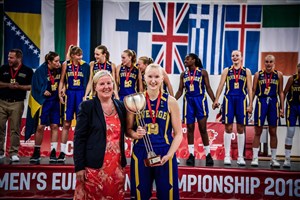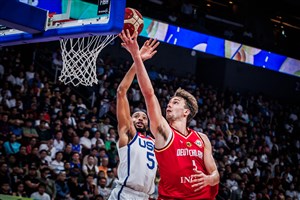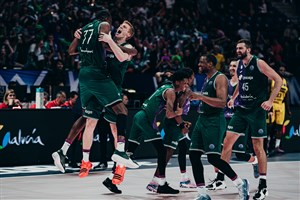
Hamburg 2018: Got gold? Netherlands and Great Britain top the wheelchair basketball world until Tokyo
HAMBURG (Steve Goldberg's Wheel World) - The kings and queens are dead. Long live the kings and queens. Isn't that how it goes? The reigning champions in this game of rolling thrones from the Rio Paralympics have been vanquished and are no longer command at the conclusion of the 2018 IWBF World Championships.
If you want to be a champion, you must play like one. Saturday delivered a decisive if not dominant yet expected 56-40 win by the Netherlands over the women of Great Britain in the women's final.
Unexpected perhaps, but not a complete surprise was an epic 79-62 performance by Great Britain in the men's final bringing home their first world championship medal since 2002.
Australia won men's bronze over Iran 68-57, while Germany secured a home medal in the closest of games 44-43 over China.
We don't want the colonies back but we will take your gold
"I love it when a plan comes together," is the famous quote from the old A-Team television show. So, what was the plan, I asked GB coach Haj Bhania. The Brits had come out early on the Americans in pool play but couldn't keep the course, losing by 7 in that one.
"Our defensive effort. We had to stop those two primary players, Jake Williams and Steve Serio. That was our plan."
GB were successful in keeping the ball away from Williams and making Serio pass, forcing the USA into bad or rushed shots. When the Americans did get open or good looks, the usual lethal precision just wasn't there.
"We just stuck with it, even when it got close. We knew we could keep control as long as we kept scoring."
 The Manning in the middle. (Photo by Steve Goldberg/SCS Media)
The Manning in the middle. (Photo by Steve Goldberg/SCS Media)
And score they did. Inside. Outside. inside the restroom, outside the building, hitting 60 percent for the game. The USA had no answer for how well the Brits were getting where they wanted to go and hitting more difficult shots when they didn't, and the USA is a team – coaching staff and players - that prides itself on finding answers to basketball's difficult questions.
"We put (a priority) on trying to stop Lee Manning from getting inside," said USA coach Ron Lykins. He went 6 of 9 for 12 points. Philip Pratt at 12 points and a dozen boards. Greg Warburton, who would be the tournament MVP, had 15. George Bates went 7 of 8 for 17 points while Harry Brown scored 17 and had 8 assists. Only one British scorer shot less than 58 percent on the day.
 Having captained his side to victory, Philip Pratt is now the Bobby Moore of British Wheelchair Basketball. (Photo by Steve Goldberg/SCS Media)
Having captained his side to victory, Philip Pratt is now the Bobby Moore of British Wheelchair Basketball. (Photo by Steve Goldberg/SCS Media)
"The boys have been great all summer," said Bhania. "They had the view they could get this done."
At which point, GB veteran Terry Bywater came over, slipped his arms around his coach's neck and shoulders, knowing I'd let him interrupt. "No one works harder than this man. No one."
Except his players maybe. At no point did they seem to tire; more so getting stronger as the reality of what they might achieve got closer and closer.
 The USA captain Steve Serio was the center of attention for the GB defense. (Photo by Steve Goldberg/SCS Media)
The USA captain Steve Serio was the center of attention for the GB defense. (Photo by Steve Goldberg/SCS Media)
"We needed to have a great defensive effort. Our goal was to get a medal, hopefully in the top two. The gold would be a bonus."
Not so for the Americans who, after taking 28 years to regain Paralympic supremacy in Rio, only came for gold. Their last world championship was in 2002.
It's GOOOOOLLLLLDDDD 🥇🥇🥇 for Great Britain 🇬🇧 (M) as they defeat USA 🇺🇸 (M), 79 - 62, to win their first ever World Championships gold medal!
— IWBF (@_IWBF) August 26, 2018
📸 © Uli Gasper#zadonk #2018wbwc #Hamburg2018 #wheelchairbasketball pic.twitter.com/PiKUJti6K2
The USA never quit. It just wasn't their day.
Williams eventually got 15 for the U.S., Brian Bell 14, and Jared Arambula 13. Serio was limited to 6 points on 3/14 shooting though he did grab 9 rebounds and dish 6 assists.
"They are such a great team, the way they play their basketball," Bhania said quietly. "It was going to be difficult to beat them."
And it was. Yet they did.
Who made the IWBF World Championship All Star teams?
 IWBF president Ulf Mehrens correctly lauded the organization of these World Championships. (Photo by Steve Goldberg/SCS Media)
IWBF president Ulf Mehrens correctly lauded the organization of these World Championships. (Photo by Steve Goldberg/SCS Media)
Dutch treat
The final margin of 16 points does no justice to the tenacity and competitiveness of this game. A rematch of the bronze medal game in Rio two years ago which was close only in the fact that both teams were on the same court (76-34) Though it was the first major final for both teams, the Netherlands were expected to win and they did.
It was the first major win for the Netherlands, noted Dutch coach Gertjan van der Linden, not discounting the 1992 Paralympic gold that went to the team he played on after a USA disqualification after the final match. "It’s been a lot of hard work (since the women's program started full-time about ten years ago)."
 Mariska Beijer and Carina de Rooij. (Photo by Steve Goldberg/SCS Media)
Mariska Beijer and Carina de Rooij. (Photo by Steve Goldberg/SCS Media)
Against the more tempered steel of the Oranje Angels, the GB women were down 9 after one quarter and 11 at the half but a change in strategy or better execution of the one they wanted led them to a 12-7 victory in the third, cutting the deficit to 6.
Mariska Beijer, the established Dutch star was having her usual game, or better than usual as she only missed one shot all night, going 10 of 11 from the floor and 1 for 1 from the line for a game high 21 points along with 12 rebounds. Her 19-year-old teammate, Bo Kramer, frighteningly focused and skilled at her age, was not.
Kramer had been averaging a double-double for the tournament and though she pulled down 13 rebounds, her shooting was an uncharacteristic 4 for 16 and just 9 points. Her primary contributions on this night would be her defense and passing.
 After giving her team a lift, Jitske Visser got one of her own. (Photo by Steve Goldberg/SCS Media)
After giving her team a lift, Jitske Visser got one of her own. (Photo by Steve Goldberg/SCS Media)
The story of the game though, both to me and her coach, was the play of Jitske Visser who scored 12 points on 50 percent )6-12) shooting. She went 4 of 5 in the first half, finding the open spots and being ready for the moment when it came to her.
I don't mention classification – the system of balancing levels of disability in the game - much in this column but it is a critical and vital part of the game. Visser is a 1.0, known as a low-pointer, noting the highest level of disability. A 4.5 is the least impaired. A maximum number of total player classification point are allowed on the court at any one time, so coaches must juggle their lineups accordingly.
Proficient low-pointers are treasured and I'm not the only one who believes Visser is the best 1.0 or 1.5 in the world with her current level of play. Not quite Annika Zeyen yet, the great German 1.5, who led her team to Paralympic gold in 2012, but close. (Let's talk after Tokyo.)
She understood how far they has come to this moment. "For us it was our first final. It was a really big step in reaching it. We knew with this team, with our vibe, with our chemistry, we could get the gold medal. The second thing is (actually) doing it."
Visser told me that she wanted to be on the court at the final whistle -she had played the whole game - but the only reason she wasn't was that van der Linden subbed her with 25 seconds left just so she could get the acclaim from the crowd that she certainly deserved.
And it wasn't just her. Having missed the opportunity after their final, I sought out her teammate Ilse Arts, a 1.5 who had a huge contribution, scoring 8 points on 57 percent shooting, all of which kept GB at bey.
Though all of Holland came together for the win, Visser summed up their advantage. "We have Mariska Beijer, I mean, she is the beast of the tournament."
Beijer, who had worked so hard and who was recognized as tournament MVP, looked as if she could go another 40 when I asked her how she felt. "I'm really hyper, like a bouncy ball. Really happy."
 Mariska Beijer defends Helen Freeman. (Photo by Steve Goldberg/SCS Media)
Mariska Beijer defends Helen Freeman. (Photo by Steve Goldberg/SCS Media)
When chatting with USA coach Trooper Johnson and Rose Hollermann earlier in the week, they mentioned Beijer's penchant for smiling during the game, even as she lay waste to opposing teams.
"I'm a nice person… kind of," Beijer responded when I asked about the smiling. "Unless I get into my zone thing and I just slaughter."
So, the field of possibilities for Tokyo is not quite as crowded as the intersection at Shibuya Station but it's far more interesting now than it was a few weeks ago.
Men's schedule, scores and game reports
Women's schedule, scores and game reports
Steve Goldberg
FIBA
FIBA's columnists write on a wide range of topics relating to basketball that are of interest to them. The opinions they express are their own and in no way reflect those of FIBA.
FIBA takes no responsibility and gives no guarantees, warranties or representations, implied or otherwise, for the content or accuracy of the content and opinion expressed in the above article.
To help make this column as inclusive as possible, please send any national or international event information, story suggestions, or comments to wheelworldmail@gmail.com.
















